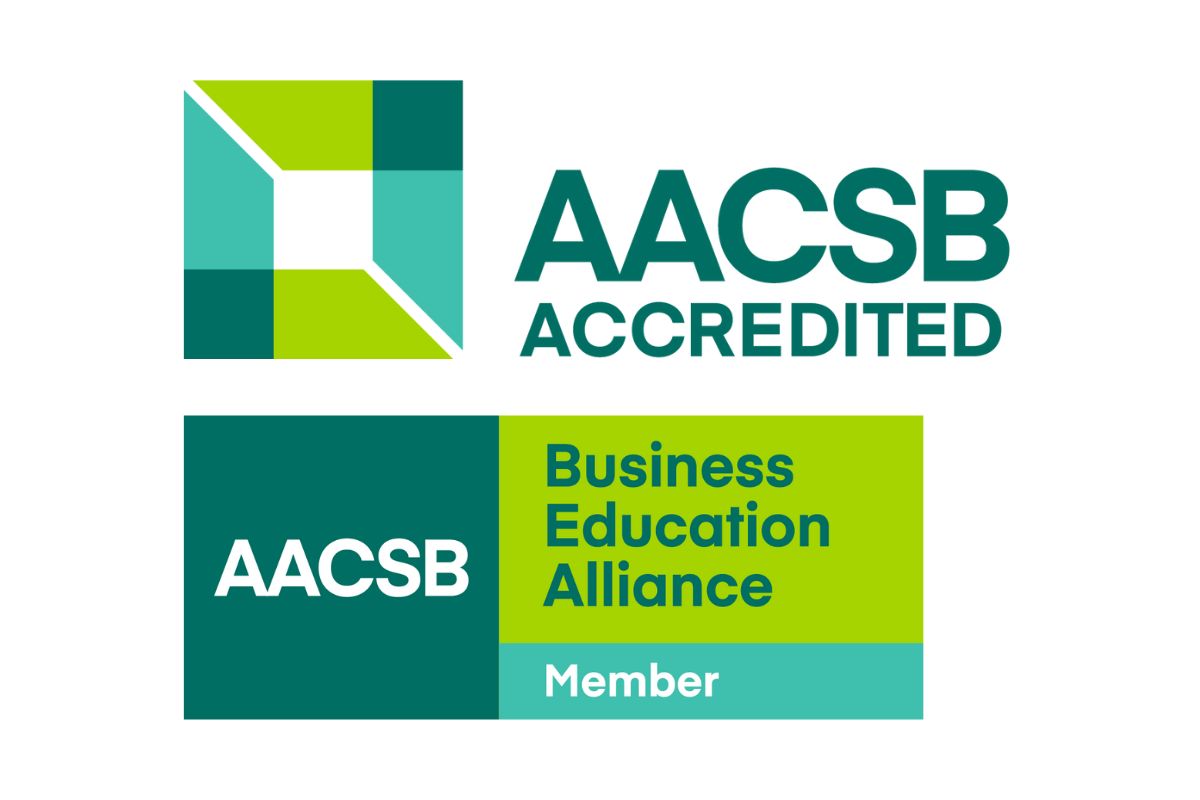
Start date
22 September 2025
Duration
3 years full-time
4 years inc. placement year
Places available (subject to change)
50
About the course
Reasons to study
- Study at an AACSB International-accredited Business School. Globally, fewer than six per cent of institutions offering business degrees achieve this accreditation.
- Economics is top in Yorkshire for Teaching On My Course, Learning Opportunities, Student Voice and Assessment and Feedback.(National Student Survey 2024)
- 95% of graduates from this course were in work or further study 15 months after graduation. (HESA Graduate Outcomes 21/22, UK Domiciled)
In an increasingly globalised world, a solid understanding of how economic systems, markets and organisations work can set you apart as a knowledgeable leader in a variety of industries. An Economics BSc(Hons) degree can take you far, setting you up for many potentially rewarding and exciting careers in the private and public sectors, including stockbroker, data analyst, investment analyst, or economist.
This course aims to equip graduates with integral skills and knowledge of Economics. You’ll learn about the science of decision making, as well as how resources are allocated to meet the needs of the population. You’ll be prepared to face and address pressing global problems, such as poverty, unemployment, inequality, and pollution.
Why study Economics BSc(Hons)
You can look forward to a high-quality education here, as Economics at Huddersfield is top in Yorkshire for learning experience, learning opportunities, academic support and more (National Student Survey 2023). You’ll also be studying at an AACSB International-accredited Business School. Globally, fewer than six per cent of institutions offering business degrees achieve this accreditation.
On campus, you’ll study a wide range of subjects including:
- microeconomics and macroeconomics
- mathematics and statistics for social sciences
- econometrics
You’ll also learn how to use industry-standard databases and software packages, such as Datastream, Stata, R and Eviews.
Away from campus, you’ll gain relevant real-world experience. After the second year of the course, you’ll put your knowledge and skills to the test in an optional 48-week work placement in your area of interest, in the UK or abroad, utilising our links with local, national, and international companies throughout many industries.
This course will prepare you for a variety of potentially exciting careers in a range of fields in the industry. You could work as an auditor, commercial finance analyst or finance officer. You can even go on to work for non-profits, government agencies, banks or even insurance companies.
Course detail
Core modules:
Introduction to Macroeconomics
This module helps to develop an understanding of the basic concepts in macroeconomics and provides you with the foundations to develop macroeconomic theory in year two. You’ll have the opportunity to develop and apply analytical skills to understand and explain various macroeconomic events such as such as unemployment, recessions and inflation.
Introduction to Microeconomics
Statistics for Social Sciences
Mathematics for Social Sciences
Accounting for Managers (Foundation)
Introduction to Financial Services
Core modules:
Intermediate Macroeconomics
The main purpose of this module is to develop a deeper understanding of modern macroeconomics. It will develop your analytical and policymaking skills and enhance your ability to analyse the implications of macroeconomic issues for government, business, and financial decision-making.
Intermediate Microeconomics
Econometrics
International Economics and Globalisation
Economic History
Option modules:
Choose one from a list which may include:
Applied Business Economics
In this module you’ll have the opportunity to learn how to integrate economic theory, mathematical methods, statistical techniques and data to study current economic issues in the business context. You’ll also learn how businesses operate and how managers make decisions and learn the different theoretical approaches to the analysis of public policy and business problems and what methods might be appropriately applied to the analysis of economics and business data.
Sustainable Aviation Management
The course offers an optional one-year (48 weeks) work placement after the second year, in the UK or abroad.
Core modules:
Applied Econometrics
This module builds on the knowledge obtained in the second year Econometrics module and develops skills needed to apply econometric techniques to real world data. By the end of this course you should have a more comprehensive understanding of central methods used in econometric analysis and be able to demonstrate knowledge of the potential problems with such approaches and potential remedies to apply. The module is aimed at giving you the skills to carry out advanced empirical analyses that are often required by public and private institutions in the professional environment, such as policy counterfactual and scenario analyses.
Undergraduate Dissertation
Decision Science
Climate Economics and Finance
Option modules:
Choose one from a list which may include:
Industrial Economics
This module considers the strategic decisions taken by firms relating to key competitive variables such as pricing; advertising; research and development; mergers and acquisitions. You’ll develop an understanding on how an organisations decision making is affected by industry structure and also the implications. You’ll also explore the impact of regulatory regimes on this decision-making.
Mobility Economics and Policy
On average 17%* of the study time on this course is spent with your tutors (either face to face or online) in lectures, seminars, workshops etc. Study and assessments will be based on your choice of modules. Your module specification/course handbook will provide full details of the assessment criteria applying to your course.
Feedback (either written and/or verbal) is normally provided on all coursework submissions within three term time weeks – unless the submission was made towards the end of the session in which case feedback would be available on request after the formal publication of results. Feedback on final coursework is available on request after the publication of results.
*based on 22/23 programme specifications
Further information
The teaching year normally starts in September with breaks at Christmas and Easter, finishing with a main examination/assessment period around May/June. Timetables are normally available one month before registration.
Your course is made up of modules and each module is worth a number of credits. Each year you study modules to the value of 120 credits, adding up to 360 credits in total for a bachelor’s qualification. These credits can come from a combination of core, compulsory and optional modules but please note that optional modules may not run if we do not have enough students interested.
If you achieve 120 credits for the current stage you are at, you may progress to the next stage of your course, subject to any professional, statutory or regulatory body guidelines.
-
The University of Huddersfield has been rated Gold in all three aspects of the Teaching Excellence Framework (TEF) 2023. We were the only university in Yorkshire and the Humber and the North West to achieve Gold ratings in all three aspects of the TEF among those announced in September 2023. In fact only 13 Universities, out of the 96 that were announced in September 2023, were Gold in all three ratings.
-
Our teaching staff rank first in England for the proportion with higher degrees and teaching qualifications, as well as being top five for those holding doctorates (HESA 2025). So you’ll learn from some of the best, helping you to be the best.
-
We are joint first in the country for National Teaching Fellowships, which mark the UK’s best lecturers in Higher Education, winning a total of 23 since 2008 (2024 data).
-
We won the first Global Teaching Excellence Award, recognising the University’s commitment to world-class teaching and its success in developing students as independent learners and critical thinkers (Higher Education Academy, 2017).
Read more about academic staff at the University of Huddersfield
At Huddersfield, you'll study the Global Professional Award (GPA) alongside your degree* so that you gain valuable qualities and experiences that could help you to get the career you want, no matter what your field of study is. On completion of the Award, you'll receive a GPA certificate from the University of Huddersfield, alongside the specialist subject skills and knowledge you gain as part of your degree, which may help to set you apart from other graduates.
Giving students access to the Global Professional Award is one of the reasons the University won ‘Best University Employability Strategy’ award at the National Graduate Recruitment Awards 2021. Find out more on the Global Professional Award webpage.
*full-time, undergraduate first degrees with a minimum duration of three years. This does not include postgraduate, foundation, top-up, accelerated or apprenticeship degrees.
Entry requirements
BBB-BBCat A Level |
120-112 UCAS tariff points from a combination of Level 3 qualifications |
Merit at T Level |
DDM-DMM in BTEC Level 3 Extended Diploma |
|
In addition you must have GCSE Maths at grade 5 or above, or grade B or above if awarded under the previous GCSE grading scheme.
If your first language is not English, you will need to meet the minimum requirements of an English Language qualification. The minimum for IELTS is 6.0 overall with no element lower than 5.5, or equivalent. Read more about the University’s entry requirements for students outside of the UK on our International Entry Requirements page.
Other suitable experience or qualifications will be considered. For further information please see the University's minimum entry requirements.
Facilities
Student support
At the University of Huddersfield, you'll find support networks and services to help you get ahead in your studies and social life. Whether you study at undergraduate or postgraduate level, you'll soon discover that you're never far away from our dedicated staff and resources to help you to navigate through your personal student journey. Find out more about all our support services.
Important information
Although we always try and ensure we deliver our courses as described, sometimes we may have to make changes for the following reasons




